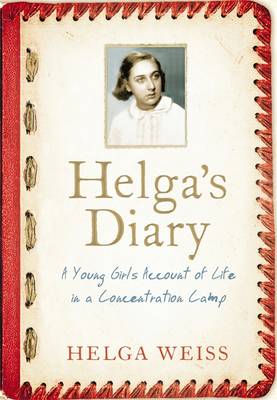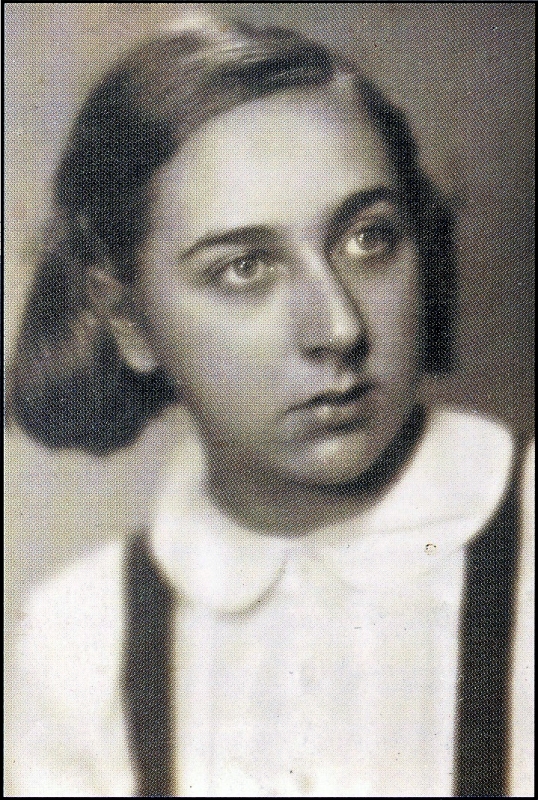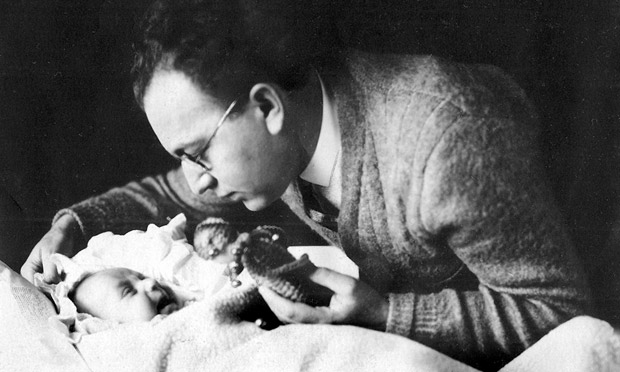'In 1944 Helga Weiss came to terms with the idea of dying - with one important condition. She was only fourteen years old and had never been strongly religious, but as she waited in queue at Auschwitz she prayed she wouldn't die after her mother. She couldn't face being left alone.'She was one of only 100 children out of 15,000 to survive Auschwitz that were sent there from Terezin.
 |
| The diary Helga wrote during her time at Terezin |
The first few pages of her diary recorded the growing threat of Nazi domination with air raid alarms, arrests, the expulsion of Jewish children from state schools, adults losing their jobs, yellow Stars of David being sewn onto clothing and the constant, claustrophobic talk of 'transports'. Her father was one of those who lost their jobs.
In December 1941 the authorities came for Helga's family, she was just twelve years old. They were sent, first to Terezin, a walled 18th century garrison town. It was also known during the war by its German name: Theresienstadt.
'The first was Terezin, where they spent three years, sleeping two or three to a bed that was really too small for one, with little to eat and to keep out the cold.'They had only one blanket but they covered themselves with their coats.
"We were together and it was a great help."Many of Helga's relatives were also sent there; it was essentially a large transit camp. Tens of thousands of Jews passed through there on their way to either Auschwitz or Treblinka. When Helga and her mother arrived there they thought that the war would soon be over and had no idea of what lay ahead.
"We were allowed 50kg of luggage so we took just our clothes and something important to us. I took two very small dolls, a pad, watercolours and crayons."
 |
| Helga Weiss |
She began to sketch life in the camp. Some of her drawings show queues for food, a bleak, basic washroom, a girl ill with tuberculosis, the crowded waiting room in the emergency clinic, people on stretchers and bread transported in a hearse bearing the message " Welfare for the young". Another drawing shows the birthday of one of her friends, Franka.
'The girls had been born in the same maternity ward, 1929, in their shared bunk bed in 1943, and in 1957, wheeling prams together. The last drawing is accompanied by a note to say that Franka died in Auschwitz before her 15th birthday.'Despite the starvation rations, disease, the lice and bed bugs that crawled across their faces at Terezin, there was a thriving cultural life. Another of her sketches shows families gathered around a trio of violinists giving a concert in a dormitory.
'I don't know if it was luck, fate,a miracle. I was together with my mother'Whilst at Terezin Helga met her first boyfriend, Ota who was an orphan and a chemistry student. He was in his mid-twenties, she was not yet fifteen.
"It was a half-childish love", she says. "We walked together and held hands... and I remember the exact place in Terezin where we first kissed." She beams. "But nothing more happened than kissing."When the Germans announced, in September 1944 5,000 men would be sent to build a new ghetto, Helga's Uncle Jindra was among those in the first group. Her father and Ota were in the second. Helga describes the day that her father left in her diary;
'the corners of his mouth twitching as he tried to smile, hands shaking as he held her. Then he was gone.'
 |
| Helga with her father, Otto in 1930 |
Helga and her mother were moved to Auschwitz where, as soon as they arrived, they joined the notorious queues; older women and mothers with young children to the left and those deemed able to work to the right. If you wanted to survive you had to be on the right. Prisoners who knew the fate that awaited those who went to the left whispered warnings:
"Don't say that you are too young, don't say you are ill - say you are able to work. Don't say you belong together, that you are mother and child"Helga was determined to say that she was older than her fourteen years and her mother younger. However, they weren't asked any questions but directed to the right queue. Helga wrote;
"I have friends who are still alive - they are the same age as I am - but their mothers were sent to the left. So I was lucky twice. Not only that I was not sent, but that I was together with my mother."
 |
| A drawing by Helga of women queueing for food |
They were told to strip naked and had their heads shaved. Helga only recognised her mother when she heard her speak.
Helga's ten days a Auschwitz were worse than her three years at Terezin but she think that it was harder still for her mother.
From Auschwitz Helga and Irena were sent to a sub-camp of Flossenburg concentration camp called Freiberg. They worked there for five months in slave labour polishing aeroplane parts. Then they were sent on a sixteen day transport by rail to Mauthausen in Austria.
'Irena was so weak that she could hardly stand and both suffered from frostbite, lice and constant, raging thirst.'Some women escaped when rumours started about the war ending but Helga wasn't sure that her mother was well enough to try. During one four-day period they had nothing to eat except two potatoes, half a cup of tea and two spoons of sugar. Along the way the news arrived that Berlin had been taken. They went without food for five days at Mauthausen.
'Had there been just one more day before peace was declared, Helga suspects that her mother would not have survived. Days later, on the 5 May 1945, the camp was liberated by the Allied forces.'Irena and Helga returned to their previous home in Prague where they began to look for Helga's father Otto. The only camp registration list his name appeared on was Terezin. The certificates were sent out after a year although Irena didn't want him to be declared dead. They found it unbearable to be alone together in the flat for the first few months because they were surrounded by memories of the life they had had before the war.
 |
| Helga Weiss today |
Irena and Helga lived together after the war until Irena died aged 84. When Helga married her husband came to live with them in the flat. Helga's husband was called Jiri Hosek, he was a double bass player with the Czech Radio Symphony Orchestra. Her son, also named Jiri is a cellist along with her granddaughter Dominika. After the war Helga became an artist and there are numerous paintings situated around her flat to commemorate her career.
Sources:
- The Guardian
- http://i.telegraph.co.uk/multimedia/archive/02482/Helga-drawing-1_2482663b.jpg
- http://images.twomillionbooks.com/9780670921416.jpg
- http://static.guim.co.uk/sys-images/Guardian/Pix/pictures/2013/2/21/1361461612720/Helga-Weiss-father-011.jpg
- http://newsletter.pamatnik-terezin.cz/wp-content/uploads/Z1-2012/foto_5.jpg
- http://www.jewishbookweek.com/sites/default/files/styles/event_node/public/Picture%202.png